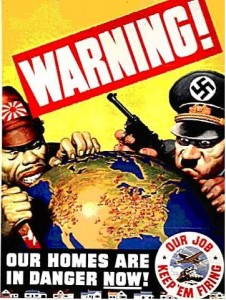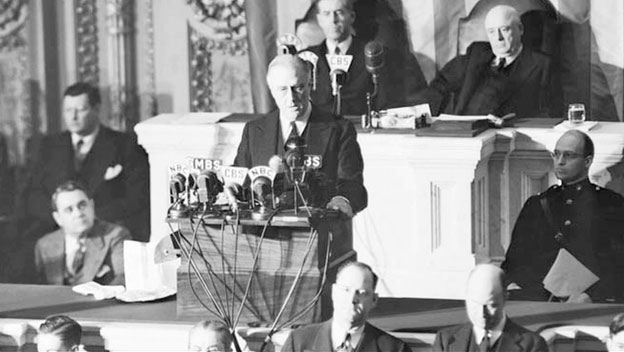In years past, different people, groups, and nations have tried to destroy the United States of America. They’ve used conventional forces, guerrilla tactics, and, increasingly over the past years, terrorism.
But today, if I wanted to destroy the United States, I wouldn’t use force. Instead, I’d use the people against themselves. I’d use not just their fears and insecurities, but also their pride and selfish desires to create division and friction between different groups within the country. In targeting these different groups, I would use both real and manufactured criteria to define them. I’d get them to define themselves by their financial status and occupation, by the color of their skin or country of their birth, by political party or even by on which side of the street they lived.
Now, this is nothing new. It’s been tried to various levels of success in the past in this country and others. We even have a new word in our Dictionary to describe one particularly successful venture from the 90s: “Balkanization.” But today, I could be much more effective because of the additional leverage I could apply through advances in information technology, mass communication, and social media.
These are all tools that have advanced in capability and availability, rapidly and well beyond the pace of any ethical framework or practice with which to wield them. Because of this, an entity, group, or even individual has carte blanche to say nearly anything, and to have those words or images transmitted instantly and globally. Meanwhile, the consumer willingly makes himself available 24/7 to these unfiltered or even targeted messages through our enraptured embrace of personal electronics in lieu of personal relationships. Moreover, that consumer is now able to interact with the messenger and, even more importantly for our desired ends, other consumers. To make the attack even more effective, these messages can be transmitted either anonymously or with false attribution.
One way to execute this strategy would be by first creating several online anonymous profiles for legitimate news sites and social media outlets. I’d make these identities represent both sides of a divide I sought to exploit or even create. I might give them names like “BLM of Central Texas,” “TrueBlue Cop,” “Concerned Mom,” “Aryan666,” “In Christ Alone,” “Gangsta,” or… well, you probably get the picture. If I had time, I might spend some time creating a backstory by commenting somewhat benignly on various issues, building a friends list, or even a “fanbase.” Yet, to be realistic, few people check very deeply into sources these days, so I could probably spend my time and efforts more effectively simply by creating more shallow online identities.
Then, I would look for my opportunity – a current event that illuminated that targeted divide. If no such event happened, I might even manufacture one with a contrived or adapted news story I reported and transmitted on a fictitious news site. Again, fact-checking and contemplation are not strengths of my targeted population – the American people’s desire to get ahead of a near-instantaneous news cycle has outpaced their appetite for accuracy or even conscious thought.
A ripe opportunity would be the stories surrounding the recent officer-involved shootings, protests, and ultimately, the slaying of police officers.
Now, I’d commence my attack. I’d make some inflammatory comments about black men killed by police – ranging from mild to wild. I’d attack their character, and then black people in general. My hope would be that I’d get a response from other commenters, but I wouldn’t need to – I would also pit my online identities against each other. They are cheap and expendable.
Simultaneously, I’d make statements about the cops involved, and continue to attack police officers in general. Again, I’d hope someone would bite the troll bait, but I’d engage with empty personae as well, just to get the fires rolling.
I’d do the same on the fictitious organizational pages, lending credence to the growing appearance that these thoughts were held not by individuals but entire groups.
I’d post links to videos of “violence porn” – police brutality and shootings, looting in Ferguson, gang and drug executions. I’d use the power of Google to find other links to stories, old or new, legitimate or false, to fan the flames.
Oh, and memes… I’d make lots of memes. It seems easy these days to boil complex controversies into a couple lines of text written in bold letters on the photo of a Hollywood personality or generic protagonist/antagonist – and post those also. The beauty of a meme is it is so shareable, and by simplifying the argument it sharpens the divides.
Soon, incredibly soon due to the modern phenomena of media, I wouldn’t need to do anything but sit back and look for the next divide I wanted to exploit. If the fires of hatred, mistrust, and fear seemed to lessen, I might stoke them again, but that is unlikely. Again, in the absence of ethical frameworks and practice, social media is like a drought-baked forest waiting for a match.
That’s what I’d do if I wanted to destroy this country. It’s a good thing I don’t, because I’m pretty sure I could be successful.
In fact, this strategy is already in play by others, and we’re playing right into their hands. By doing so, we’re allowing a small number of foes the luxury of a force multiplier heretofore unseen – the ability to turn masses of people against themselves rapidly and with little expenditure of material or personal capital.
Take a few minutes (and only a few minutes) and check out the comments on stories about current controversies. You will read words you would never hear in even the most heated of in-person intoxicated arguments. Angry, provocative, inciting, and hateful messages fomenting increasingly angry, provocative, inciting, and hateful responses. If you don’t think a lot of this is intentional, you are fooling yourself.
The countermeasure is simple, but not easy. In this age of instantly-available media, we need to take time to turn it off. We need to take the time to meet people face-to-face, to shake hands, hear concerns, discuss differences, and have vigorous debate when necessary.
This is not efficient. It is not quick. It is not convenient. It is not easy.
It is, however, necessary.

